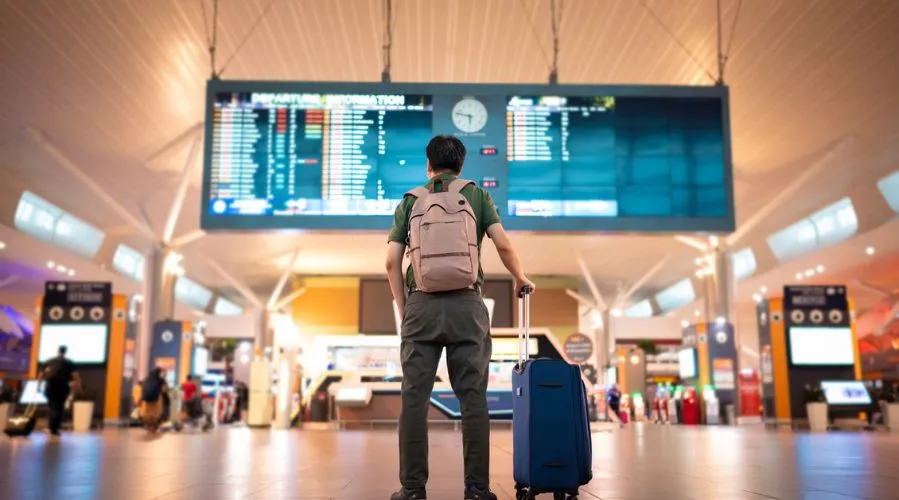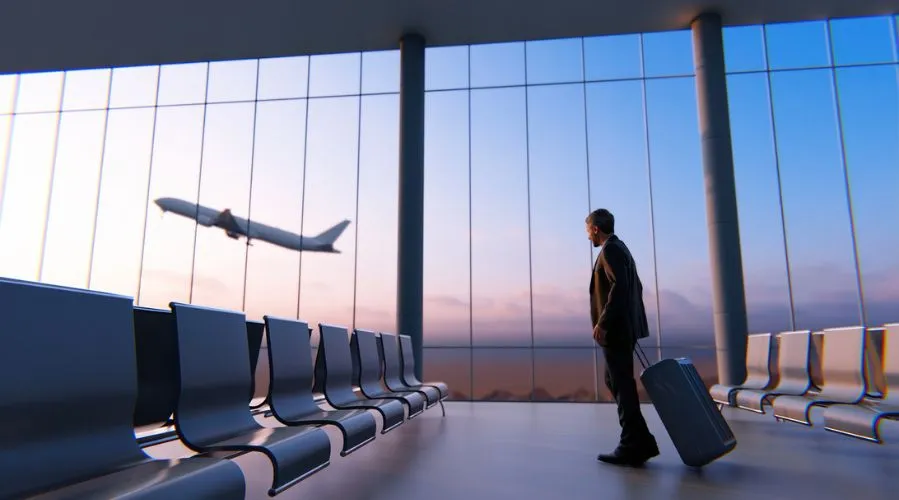Written by S.Castlemilk
Date: 05/05/2025
This is it! As the doors of the visa centre or embassy close behind you, your Schengen visa application file safely in the right competent hands, you realise you’ve successfully survived the most difficult stages of the visa application process. Now, a new challenge awaits: keeping your cool until the final answer arrives. Granted or denied? Pack your bags or reschedule?
To stop you from losing your marbles while you impatiently wait for the outcome, the AXA team has decided to prepare a simple guide on how to track the progress made in the examination of your Schengen visa application, using all the possible visa tracking tools at your disposal.
Grab your patience and reading glasses and let’s go!
- The Who’s Who of Schengen visa applications
- What happens once you’ve submitted your Schengen visa application?
- How can you monitor the progress of your Schengen visa application?
- What information must you provide to track your application online?
- How long is the Schengen visa examination process?
- Who decides to grant or deny a Schengen visa?
- How will you be informed of the decision concerning your Schengen visa application?
- What must you do if your Schengen visa request is granted?
- What are your options if your Schengen visa is denied?
- A few tips to reduce Schengen visa processing time and avoid visa refusal.
The Who’s Who of Schengen visa applications
Depending on where you live and what Schengen country you wish to visit, you will submit your visa application file either at a visa centre, an embassy or a consulate.
Let’s start by taking a closer look at who does what in the whole visa shenanigan.
Visa centres commissioned by Schengen countries
When the entire visa application process cannot be handled by embassies or consulates themselves, several countries commission private visa centres- such as VFS Global, TLSContact or Capago- to manage certain stages of the visa application procedure.
Schengen consular services entrust these private companies with:
- Welcoming and informing applicants,
- Handling the appointments during which applicants submit their application file,
- Checking that all compulsory documents are enclosed, including the duly completed visa application form,
- Collecting the applicants’ biometric data (digital prints and photography),
- Recovering visa and service fees,
- Monitoring the progress of the applications,
- Returning passports.
Important! Visa centres are not part of the decision-making process and are never in charge of examining files or deciding to grant or deny a Schengen visa request.
The consular services of Schengen countries
As we’ve seen, recovering Schengen visa application files can sometimes be delegated to private visa centres, allowing consular services to focus on the crucial aspects of visa processing while optimising the number of visa applications examined. In other situations, consular services (embassy or consulate) handle the entire visa application procedure, from submission to decision.
Wherever you submit your application file, the consular services always remain in charge of:
- Examining visa application files,
- Deciding to grant or deny a visa.
What happens after you’ve submitted your Schengen visa application?
If you’ve submitted your application file at a visa centre, it will be transferred to the consular services of your country of destination.
- The consular services will make sure that:
- Your application file is complete i.e. that all the compulsory documents have been provided including your travel insurance certificate,
- Your passport and documents are authentic,
- Your biometric data have been collected,
- Your visa fees have been paid.
If one or several of these conditions are not met, the visa request is deemed inadmissible and is not examined. Consequently, your visa demand is denied.
If all is in order, they move on to the next stage.
- They examine the application file, paying close attention to:
- The justification of the purpose of your trip.
- Your subscription to compulsory travel insurance.
- Your intent and ability to leave the Schengen area at the end of your stay.
- Your accommodation arrangements in the visited Schengen country.
- Your proof of sufficient financial means to support yourself during your stay in the Schengen area.
- They also consult the European data files (the Visa Information system or VIS, and the Schengen Information System or SIS) to check that:
- The length of your stay in the Schengen area will be in compliance with the 90/180 days rule.
- No alert, such as an entry ban from the Schengen area, has been issued against you.
- You do not represent a threat to public order, national security or public health.
Good to know: A “prior consultation” of all Schengen countries is sometimes carried out to make sure that no Member State is opposed to a visa candidate’s entry in the area. This systematically applies to nationals from the following countries:
Afghanistan, Algeria, Armenia, Azerbaijan, Bangladesh, Belarus, D.R. Congo, Egypt, Eritrea, Ethiopia, Iran, Iraq, Jordan, Kazakhstan, Kenya, (North) Korea, Kuwait, Kyrgyzstan, Lebanon, Libya, Mali, Mauritania, Morocco, Nepal, Niger, Nigeria, Pakistan, Palestine, Qatar, Russia, Rwanda, Saudi Arabia, Somalia, Sri Lanka, Sudan, Syria, Tajikistan, Tunisia, Turkmenistan, Uzbekistan, Vietnam, Yemen.
- After the examination process, the consular services decide to grant or deny the visa request.
- They send your passport back to the visa centre if that is where you’ve submitted your application.
- You are then informed that you can recover your passport at the visa centre or the consular premises.
How can you monitor the progress of your Schengen visa application?
Now, to our matter at hand: how can you follow the status of your Schengen visa application i.e. the progress made in the examination of your request?
Your main contact when it comes to monitoring your visa application is first and foremost the structure where you’ve submitted your file i.e. the embassy, consulate or visa centre.
While tracking procedures in embassies and consulates can vary from one Schengen country to another, and sometimes even from one diplomatic representation to the next, visa centres offer an online tracking system and can sometimes also provide information by email or text message.
How to track your Schengen visa application submitted at an embassy or consulate?
If you have submitted your application file in the embassy or consulate of a Schengen country, you will have received, with your application receipt, the information necessary to track the progress of your file.
Some countries offer a centralised online tracking system (for example, France-Visas centralises all the visa for France applications) but sometimes only the consular services themselves can provide information.
How to track your Schengen visa application submitted at Capago?
- Go to Capago’s homepage.
- Select your home country. You will be redirected to the specific page of your country of residence.
- Click on “Track your visa application”.
- Log in with your Capago reference number and your email address.
- Click on “My Applications”.
How to track your visa application submitted at TLSContact
- Visit TLSContact homepage
- Log in thanks to your email address and your password.
- Click on “My Applications”.
How to track your visa application submitted at VFS Global
- Select the country where you’ve submitted your visa application.
- Enter your reference number and your last name.
- The status of your visa application appears on the same page, below the login space.
Caution! Remember to allow popups in your browser to access the tracking space.
How to track your visa application submitted at iDATA?
If you’ve submitted your visa application at an iDATA centre, to obtain a visa for Germany from Turkey (Türkiye) for example, you can monitor your file online thanks to their tracking tool.
You will need to fill in:
- Your passport number
- The number of the barcode featured on your receipt.
What information must you provide to track your application online?
Depending on how you are tracking the progress of your application, you might need to provide different pieces of information. The most basic will be:
- Your first and last name, your date of birth, your nationality,
- The reference number of your visa application,
- Your passport number,
- Your email address, your phone number,
- Your country of residence, your country of destination.
Where can you find the reference number of your Schengen visa application?
When you submit your Schengen visa application, you are given a receipt which features the unique reference number attached to your file as well as instructions on how to track the progress and status of your visa application.
Can information about your visa application be given by phone or email?
No. To protect personal data, no information regarding ongoing visa examinations can be provided over the phone as visa services are unable to check the identity of callers.
Visa services are only allowed to deliver information concerning visa procedures in person and only to:
- the applicant themselves
- a third party presenting the applicant’s written authorisation.
- legal representatives (such as the parents of minor applicants).
How long does it take to examine a Schengen visa application?
In other words, when will you be relieved of this insufferable uncertainty?
For short-stay type C visas, processing time is usually 15 calendar days and can reach, according to the Visa Code, a maximum of 45 days, particularly during the busier times of the year such as end of the year and summer holidays.
Beware! Visa processing time is estimated from the moment you submit your application file.
Who decides to grant or deny a Schengen visa?
Visa applications are always examined by the consular services of a country part of the Schengen area and consequently, decisions to grant or deny a visa are also made by the Schengen Member State. In most cases, the country of destination of the applicant.
However, in compliance with the European Union Visa Code, if a Schengen State has no diplomatic representation in a country, it can entrust another Schengen State to examine applications and decide to grant or deny a visa.
Good to know!
This has no consequence for the applicant as the Schengen visa is uniform, meaning that attribution criteria and the rights the visa confers are the same whatever the country which examines the application and grants the visa.
How will you be informed of the decision concerning your Schengen visa application?
Once your visa application has been examined, you will be asked by phone, email or text to come recover your passport where you have left it (embassy, consulate or visa centre).
Important! You will only be informed of the result of your visa request when you recover your passport, never online or over the phone.
If your visa has been granted, you will find a visa sticker attached to your passport.
If your Schengen visa request is denied, you will be provided with a document stating the reasons for this refusal and how you can appeal the decision.
Good to know!
Some countries, institutions or external service providers also offer a mail delivery service, allowing you to receive your passport and, hopefully, a visa sticker, directly at home.
What should you do if your visa request is granted?
Of course, a little happy dance! But that’s not all!
We recommend:
1- Once you’ve recovered your passport and your visa, take the time to check that there are no mistakes such as the spelling of your first and last names, your passport number, the type of visa granted, its date of validity, the number of authorised entries, etc.
2- In case of discrepancies between what is written on your visa and what features on your application form/passport, you could be refused entry in the Schengen area upon your arrival.
3- If you notice something wrong, make sure to inform the consular services as soon as possible (ideally on the spot!) in order for them to correct it if possible.
Important!
- Upon your arrival in the Schengen area, border police can ask you to present any or all documents featured in your Schengen visa application.
Always keep copies of these documents with you during your trip. - A visa grants you the right to enter the Schengen area, but the final decision remains in the hands of the border police. So behave!
What are your options if your Schengen visa is denied?
→ If the refusal is due to mistakes and oversights (typos, missing documents, lack of precision, etc.) you can submit a new application, making sure this time it complies with all requirements.
→ If the refusal is due to more fundamental reasons, you can ask for your application to be re-examined by following the procedure detailed in the refusal notice.
A few tips to reduce Schengen visa processing time and avoid visa refusal.
- Start by checking what type of visa is best suited to your situation.
- Fill out your visa application form carefully, use our step-by-step guide.
- Submit a complete Schengen visa application file meeting all the necessary requirements.
- Subscribe to travel insurance in compliance with the requirements of the European Union, this will guarantee it will be accepted with your visa application.
Good news! The different options of AXA Schengen travel insurance meet these criteria and are accepted by all Schengen countries.
Get your free online quote now, no personal details required!
You might find these articles interesting:
- How to track your French visa application
- Schengen visa application: a step-by-step guide.
- How to avoid Schengen visa refusal?
- In which Schengen country is it easier to obtain a visa?
FAQ
Is there a centralised system, common to all Schengen countries, to track my visa application file?
No. The implementation of a European electronic system centralising all visa applications and their examination status is in the works but not yet operational. For the moment, each country and private service provider still has their own system.
How often do Schengen countries grant or deny visa requests?
Every year, the European Commission publishes statistics showing the number of visa applications submitted and the number of visas issued per Schengen country. Up to you to draw your own conclusions on which country is the most lenient or demanding!
My Schengen visa request has been denied. Will my visa fees be refunded?
No. Schengen visa fees and service fees- applicable when the application is submitted via a private visa centre- are not refundable. However, AXA Schengen will reimburse your travel insurance fee if you provide your notice of visa refusal.
AXA already looks after millions of people around the world
With our travel insurance we can take great care of you too
AXA Schengen's Travel Insurances

AXA Schengen Basic
AXA Schengen Basic is perfect to obtain your Schengen visa. This travel insurance meets all the requirements demanded, covers you in all the countries of the Schengen Area as well as 4 European microstates (Andorra, Vatican City, Monaco and San Marino).

AXA Schengen Essential
AXA Essential is perfect to obtain your Schengen visa. It provides coverage in all the Schengen countries + the European microstates + all the EU countries (including UK, Cyprus and the Republic of Ireland). And you get additional guarantees compared to AXA Schengen Basic.

AXA Schengen Annual
AXA Annual is perfect to obtain your Schengen visa. This annual travel insurance is ideal for those who often travel to Europe as well as multiple-entry Schengen visa holders. You get the same guarantees as AXA Schengen Annual for different countries during 90 days.


